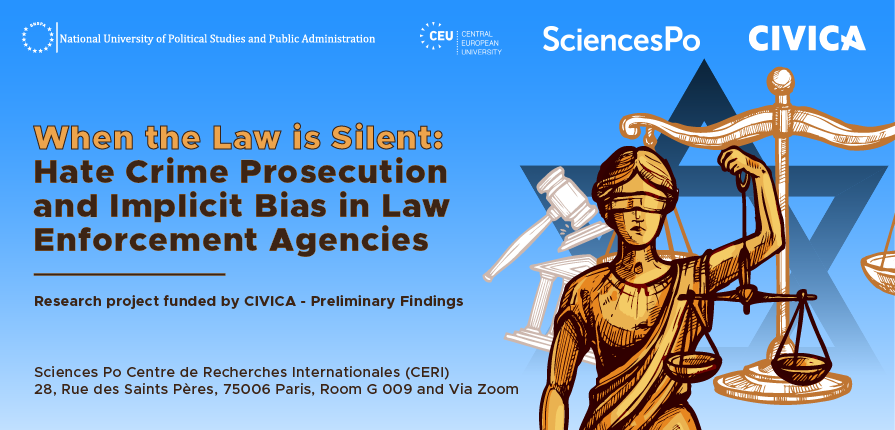The seminar will include the unraveling of the findings following a survey conducted among 40 prosecutors in Romania, in an attempt to 1) uncover the level of implicit bias when handling files involving an anti-Semitic motive and 2) potentially explain the low prosecution rates in cases of antisemitism, which are treated as “soft” crimes.
The data was collected through an anonymous online-survey, with 35 items included in the questionnaire, together with a hypothetical scenario. Key findings will be discussed among the members of the team, who will present the research as a first of its kind in Romania and a groundbreaking study that can serve as a groundwork for future and more extensive research on the topics on antisemitism, implicit bias among the judiciary and the wider social and political effects they can have.
The seminar will take place at Sciences Po’s Centre de Recherches Internationales (Center for International Studies – CERI), 28, rue des Saints Pères, 75006 Paris, Room G 009 and Via Zoom – hybrid format
The collaborative research projects are funded from the European Union’s Horizon 2020 research and innovation programme, under the CIVICA Research project.
Outline of the seminar:
- Introduction to the research project: univ. dr. Andrei Muraru, SNSPA
- Presentation by Oana-Cosmina Mihalache, SNSPA
Discussants:
- Nadège Ragaru, Sciences Po, CERI
- Constantin Iordachi, CEU
SILAW team members & main collaborators:
- Lect. univ. dr. Andrei Muraru, SNSPA, Team leader
- Prof. Nadège Ragaru – Research Professor at Sciences Po Paris, Team member
- Prof. Constantin Iordachi – Professor of History at the Central European University, Vienna, Team member
- Oana-Cosmina Mihalache – PhD candidate, SNSPA, Team member
- Andreea Dobriță – PhD student in Sociology, SNSPA, Research coordinator in Bucharest
When the Law is Silent: Hate Crime Prosecution and Implicit Bias in Law Enforcement Agencies
This CIVICA Research project aims to investigate the prosecution of hate crimes in Romania, Bulgaria and Germany, with a specific focus on antisemitism, by looking into intrinsic motivations among the police and the judiciary. It also examines the structural patterns of implicit bias and the reasons why they remain silent and undetected – among country-wide surveys, and NGO or anti-discrimination groups and institutions’ activities.
The driving research questions are:
- How does implicit bias among the police and the judiciary influence the judicial solutions to anti-Semitic and other hate crime cases?
- What are the individual, institutional and societal factors that can account for a selection bias among law enforcement agencies?
- How can patterns in the prosecution of cases involving hate crime influence the status of minorities, the relation between minority and majority groups and how do they reflect in the wider social and political order?
The aim of the project is to account for different ways in which implicit bias among the police and the judiciary can reveal either an undetected antisemitism or a spike in anti-Semitic violence. The main case study is represented by Romania, considering the period after 2015 to today. At the same time, by employing the method of asymmetrical comparison, the cases of Bulgaria and Germany will be considered as well.
One of the main objectives of the research is to first identify patterns of implicit bias among the judiciary and then assess their role in how individual files are legally instrumented. This will allow the team of researchers to examine the wider individual, institutional and societal markers that can account for bias and prejudice among law enforcement agencies and personnel.
Finally, the end results will be used to situate patterns of implicit bias into the wider matrix of the political order in Romania, Bulgaria and Germany, and formulate preliminary hypotheses for other European countries as well, by discussing issues of minority status and integration issues. In this way, the assessments will situate the research into the wider agenda of democratic backsliding literature and issues of social hierarchy, violence and oppression.



